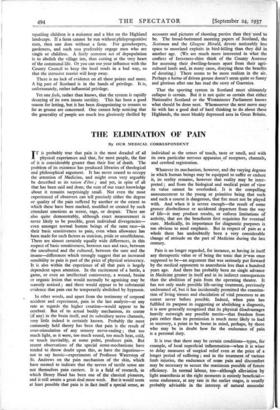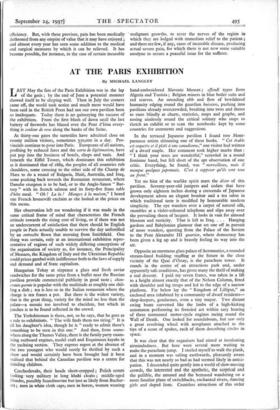THE ELIMINATION OF PAIN
By OUR MEDICAL CORRESPONDENT
IT is probably true that pain is the most dreaded of all physical experiences and that, for most people, the fear of it is considerably greater than their fear of death. The problem of its existence has produced libraries of theological and philosophical argument. It has never ceased to occupy the attention of Medicine, and might even very arguably be described as its raison d'etre ; and yet, in spite of all that has been said and done, the sum of our exact knowledge about it remains surprisingly small. Not even the most experienced of observers can tell precisely either the degree or quality of the pain suffered by another or the extent to which these have been marked, modified or created by such attendant emotions as terror, rage, or despair. There are also quite demonstrably, although exact measurement is never likely to be possible, great individual divergencies— even amongst normal human beings of the same race—in their basic sensitiveness to pain, even when allowance has been made for such factors as stoicism, pride or unselfishness. There are almost certainly equally wide differences, in this respect of basic sensitiveness, between race and race, between the uncultured and the cultured, between the sane and the insane—differences which strongly suggest that an increased sensibility to pain is part of the price of physical aristocracy. It is also within the experience of all that pain is largely dependent upon attention. In the excitement of a battle, a game, or even an intellectual controversy, a wound, bruise or organic lesion that would normally be agonising may be scarcely noticed ; and there would appear to be substantial evidence that pain can be temporarily abolished by hypnosis.
In other words, and apart from the testimony of corporal accident and experiment, pain in the last analysis—at any rate as regards the higher creation—would appear to be cerebral. But of its actual bodily mechanism, its centre (if any) in the brain itself, and its subsidiary nerve channels, very little indeed is certainly known. Probably the most commonly held theory has been that pain is the result of over-stimulation of any sensory nerve-ending ; that too much light, as it were, too much sound, too much heat, cold, or touch inevitably, at some point, produces pain. But recent observations of the special sense-mechanisms have tended to throw doubt upon this, as have the ingenious— not to say heroic—experiments of Professor Waterston of St. Andrews on the pain mechanism of the skin, which have seemed to indicate that the nerves of tactile sense are not themselves pain carriers. It is a field of research, in which Henry Head has been one of the classical pioneers, and it still awaits a great deal more work. But it would seem at least possible that pain is in fact itself a special sense, as individual as the senses of touch, taste or smell, and with its own particular nervous apparatus/of receptors, channels, and cerebral registration.
Whatever its mechanism, however, and the varying degrees in which human beings may be equipped to suffer or endure it, its reality remains, however that reality may be inter- preted ; and from the biological and medical point of view its value cannot be overlooked. It is the compelling announcement to the young or primitive being that such and such a course is dangerous, that fire must not be played with. And when it is severe enough—the result of some grosser disobedience or accidental departure from the way of life—it may produce results, or enforce limitations of activity, that are the beneficent first requisites for eventual cure. Medically, its importance for diagnostic purposes is too obvious to need emphasis. But in respect of pain as a whole there has undoubtedly been a very considerable change of attitude on the part of Medicine during the last century.
Pain is no longer regarded, for instance, as having in itself any therapeutic value or of being the tonic that irwas once supposed to be—an argument that was seriously put forward by the medical opponents to anaesthesia less than a hundred years ago. And there has probably been no single advance in Medicine greater in itself and in its indirect consequences than the abolition of pain from the operating theatre. It has not only made possible life-saving treatment, previously undreamed of, but it has incidentally permitted the examina- tion of living tissues and elucidation of vital processes to an extent never before possible. Indeed, when pain has fulfilled its purpose in suggesting or abolishing a diagnosis, it is now generally recognised that its physical disadvantages heavily outweigh any possible merits—that freedom from pain rather than its permission is much more likely to lead to recovery, a point to be borne in mind, perhaps, by those who may be in doubt how far the endurance of pain is a personal duty.
It is true that there may be certain conditions—types, for example, of local superficial inflammation—when it is wiser to delay measures of surgical relief even at the price of a longer period of suffering ; and in the treatment of various limb injuries, the endurance of some pain and discomfort may be necessary to secure the maximum possible of future efficiency. In normal labour, too—although alleviation by light anaesthesia at the right moments is entirely beneficial— some endurance, at any rate in the earlier stages, is usually probably advisable in the interests of natural muscular efficiency. But, with these provisos, pain has been medically dethroned from any empire of value that it may have enjoyed ; and almost every year has seen some addition to the medical and surgical measures by which it can be relieved. It has become possible, for instance, in the case of certain incurable ' malignant growths, to sever the nerves of the region in which they are lodged with immediate relief to the patient ; and there are few, if any, cases of incurable disease, producing actual severe pain, for which there is not now some suitable anodyne to secure a peaceful issue for the sufferer.



















































 Previous page
Previous page